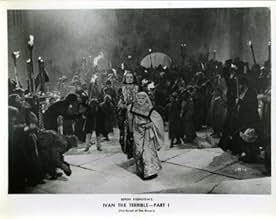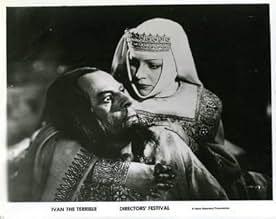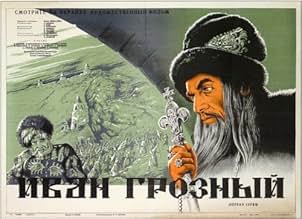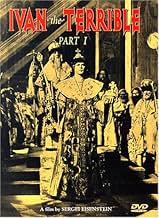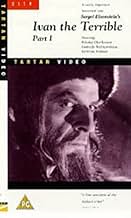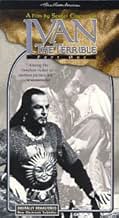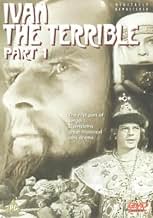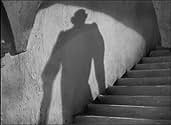NOTE IMDb
7,7/10
11 k
MA NOTE
Au début de son règne, Ivan le Terrible doit faire face à la trahison de l'aristocratie et même de ses amis les plus proches alors qu'il cherche à unir le peuple russe.Au début de son règne, Ivan le Terrible doit faire face à la trahison de l'aristocratie et même de ses amis les plus proches alors qu'il cherche à unir le peuple russe.Au début de son règne, Ivan le Terrible doit faire face à la trahison de l'aristocratie et même de ses amis les plus proches alors qu'il cherche à unir le peuple russe.
- Réalisation
- Scénario
- Casting principal
- Récompenses
- 2 victoires et 1 nomination au total
Aleksandr Rumnev
- The Stranger
- (as Aleksandr Rumnyov)
Avis à la une
I have two comments to make about some disparaging remarks made by other contributors: First, it is naive to condemn this film as "propaganda" -- GONE WITH THE WIND is all propaganda about how great the Old South was and how great the Ku Klux Klan was. LAWRENCE OF ARABIA is propaganda about how heroic and clever the English were and how corrupt the Turks were. DR STRANGELOVE is all propaganda, too. THE ALAMO and other John Wayne films are propaganda about how great the conquest of the West was, how heroic the ethnic cleansing against the Indians was, and how corrupt the Mexicans were. So spare me your hypocritical condemnation of this film as "Stalinist Propaganda".
Secondly, what definitions can there be for whether a film is "great" or not? I suggest the use of two criteria: (A) Is viewing the film multiple times worthwhile and interesting? (B) Does viewing the film represent a memorable life experience? With these criteria, it does not matter whether the film is "dated" or the acting is "overdone" or whether the sound is flawed or in this or that quality. I certainly find IVAN THE TERRIBLE more interesting the more times I view it. On the other hand, there are movies that I consider "great" even though I refuse to watch them ever again, because I found them unbearably sad -- recent examples are SCHINDLER'S LIST and MILLION DOLLAR BABY.
Secondly, what definitions can there be for whether a film is "great" or not? I suggest the use of two criteria: (A) Is viewing the film multiple times worthwhile and interesting? (B) Does viewing the film represent a memorable life experience? With these criteria, it does not matter whether the film is "dated" or the acting is "overdone" or whether the sound is flawed or in this or that quality. I certainly find IVAN THE TERRIBLE more interesting the more times I view it. On the other hand, there are movies that I consider "great" even though I refuse to watch them ever again, because I found them unbearably sad -- recent examples are SCHINDLER'S LIST and MILLION DOLLAR BABY.
This first part of Eisenstein's filming of the life and times of "Ivan the Terrible" has lots of drama, very good characterizations, fascinating settings, and plenty of action. Nikolai Cherkasov is completely convincing in the lead role, and the rest of the cast complements him well (especially Serafima Birman as his crafty aunt). This period in history is quite interesting and significant in itself, and Eisenstein presents everything in a fashion that is thoughtful and also enjoyable to watch.
Ivan combined a remorseless personal ambition with a genuine desire to strengthen and protect Russia, while the boyars, who opposed him, acted from motives that were almost exclusively personal. Combined with the plans of Russia's neighbors, all of this makes for a complex and interesting series of events, and the movie does a good job of presenting both the events and the possibilities, both on the surface and behind the scenes. Not the least of the reasons why it works so well are the settings. They are always interesting, believable, and atmospheric - and the indoor settings are especially so.
Part One is praiseworthy both in its own right and as the foundation for the outstanding sequel. Eisenstein generally excelled at depicting important periods in his country's history, and his series on Ivan's critical reign demonstrates all of his many skills. His attention to detail (of which there are too many examples even to try to list) and his appreciation for the overall picture make this a memorable film of high quality.
Ivan combined a remorseless personal ambition with a genuine desire to strengthen and protect Russia, while the boyars, who opposed him, acted from motives that were almost exclusively personal. Combined with the plans of Russia's neighbors, all of this makes for a complex and interesting series of events, and the movie does a good job of presenting both the events and the possibilities, both on the surface and behind the scenes. Not the least of the reasons why it works so well are the settings. They are always interesting, believable, and atmospheric - and the indoor settings are especially so.
Part One is praiseworthy both in its own right and as the foundation for the outstanding sequel. Eisenstein generally excelled at depicting important periods in his country's history, and his series on Ivan's critical reign demonstrates all of his many skills. His attention to detail (of which there are too many examples even to try to list) and his appreciation for the overall picture make this a memorable film of high quality.
10zetes
Before I new much about him, when I used to see the box for Alexander Nevsky on the Foreign shelf at my local video store, I always misread Eisenstein's name, transforming it into Einstein. Well, Einstein suits him just as well, for what Albert Einstein was to science Sergei Eisenstein is to the cinema. Witness Battleship Potemkin, possibly the most rousing film ever made. Today, nearly 80 years after it was made, it still has the power to inspire revolution. Its amazing montage editing style may have died with silent cinema (although there are at least two directors today who are somewhat similar: Shinya Tsukamoto and Darren Aranofsky), but it will never be forgotten.
When Eisenstein moved to sound, he realized that rapid montage would not work in the new medium. He adapted his style, perfecting a new one. Alexander Nevsky and the two Ivan the Terrible films come off to many people as stale historical epics. To me, they come off as the very peak of that genre. Usually I do find historical epics stuffy, but the direction, acting, writing, cinematography, and music of these three films are exquisite, so far beyond anything that I've ever seen that these films stir me nearly as much as Potemkin does.
Ivan the Terrible I is a bit confusing in its plot to begin with, but you have to stick with it. First off, there are many, many characters. A great many are not mentioned by name, and most of the rest are only named on rare occasions. But Eisenstein familiarizes us with the characters' faces. These faces are perfectly chosen and lighted spectacularly. The light is so harsh that every crag in a person's face is clear, and noses cast foreboding shadows. The way time progresses in this film is without much warning, and one problem I encountered was identifying Ivan himself. I did not catch on at first when the first sequence ended and the second sequence began, and Ivan, in the second sequence, has a beard. Once you realize that, though, you're home free. That beard serves as a great identifier throughout the film (and is used in many ways by Eisenstein).
I was expecting to like this film, but I found myself obsessed with this utter masterpiece. 10/10
When Eisenstein moved to sound, he realized that rapid montage would not work in the new medium. He adapted his style, perfecting a new one. Alexander Nevsky and the two Ivan the Terrible films come off to many people as stale historical epics. To me, they come off as the very peak of that genre. Usually I do find historical epics stuffy, but the direction, acting, writing, cinematography, and music of these three films are exquisite, so far beyond anything that I've ever seen that these films stir me nearly as much as Potemkin does.
Ivan the Terrible I is a bit confusing in its plot to begin with, but you have to stick with it. First off, there are many, many characters. A great many are not mentioned by name, and most of the rest are only named on rare occasions. But Eisenstein familiarizes us with the characters' faces. These faces are perfectly chosen and lighted spectacularly. The light is so harsh that every crag in a person's face is clear, and noses cast foreboding shadows. The way time progresses in this film is without much warning, and one problem I encountered was identifying Ivan himself. I did not catch on at first when the first sequence ended and the second sequence began, and Ivan, in the second sequence, has a beard. Once you realize that, though, you're home free. That beard serves as a great identifier throughout the film (and is used in many ways by Eisenstein).
I was expecting to like this film, but I found myself obsessed with this utter masterpiece. 10/10
Perhaps if I had not watched von Sternberg's SCARLET EMPRESS the day before I watched IVAN THE TERRIBLE, I would have appreciated Eisenstein's film more.
SCARLET EMPRESS is von Sternberg's own historical Russian epic: Catherine the Great (played by Marlene Deitrich) rises to power despite conspiracies against her--conspiracies much like the ones that face Ivan in Eisenstein's film. The films are remarkably similar, and Eisenstein's influence on von Sternberg's lighting and montage sequences could not be more apparent.
Unfortunately, IVAN THE TERRIBLE is light years behind SCARLET EMPRESS in terms of the integration of sound with image, humanistic characterizations, and nuanced (as opposed to exaggeratedly theatrical) acting styles. If I had to guess, I'd say IVAN THE TERRIBLE was made ten years before SCARLET EMPRESS. In fact, it was made ten years after.
I'm a big fan of Eisenstein's BATTLESHIP POTEMPKIN, and as a student of Russian history and culture, I expected IVAN THE TERRIBLE to be a thoroughly engaging film. Instead it seemed a primitive effort: a move backward for a man who excelled at silent storytelling but couldn't evolve along with cinema. Of course, this IS Eisenstein, and IVAN is a very intelligent and well-crafted film, but viewed alongside its contemporaries, its shortcomings become all too apparent.
SCARLET EMPRESS is von Sternberg's own historical Russian epic: Catherine the Great (played by Marlene Deitrich) rises to power despite conspiracies against her--conspiracies much like the ones that face Ivan in Eisenstein's film. The films are remarkably similar, and Eisenstein's influence on von Sternberg's lighting and montage sequences could not be more apparent.
Unfortunately, IVAN THE TERRIBLE is light years behind SCARLET EMPRESS in terms of the integration of sound with image, humanistic characterizations, and nuanced (as opposed to exaggeratedly theatrical) acting styles. If I had to guess, I'd say IVAN THE TERRIBLE was made ten years before SCARLET EMPRESS. In fact, it was made ten years after.
I'm a big fan of Eisenstein's BATTLESHIP POTEMPKIN, and as a student of Russian history and culture, I expected IVAN THE TERRIBLE to be a thoroughly engaging film. Instead it seemed a primitive effort: a move backward for a man who excelled at silent storytelling but couldn't evolve along with cinema. Of course, this IS Eisenstein, and IVAN is a very intelligent and well-crafted film, but viewed alongside its contemporaries, its shortcomings become all too apparent.
Eisenstein's 'Ivan the Terrible' once featured in an American book of the 50 worst films of all times, along with 'Attack of the Killer Tomatoes' and 'Plan 9 from Outer Space'.
But as true cinemaniacs acknowledge, 'Ivan', along with 'Ivan the Terrible Part 2', is one of the great masterpieces of the screen. Its style is highly artificial, the acting operatic with no condescension to realism. But the viewer is swept away by the stylised pacing, the way each scene is so precisely plotted and designed -- each camera shot becomes a precious ornamented jewel. The film is, like the earlier 'Alexander Nevsky', as much a vehicle for the great Russian composer Prokofiev as for Eisenstein -- the two attained a cinematic union of image and music which has been rarely equaled since.
The two 'Image' Region 1 DVDs for Ivan Parts One and Two are spartan affairs, with no added features. The orchestral soundtrack is definitely low-fi. But the print sources must have been excellent -- the black-and-white prints are as lustrous as the finest modern movie, the images sharp and clear. And when the film suddenly switches from black-and-white and erupts in colour, the colour is dense and brilliant, unlike the bleached and pale versions usually doing the art-cinema rounds.
How fantastic to have available such treasures on DVD, in such pristine condition! Buy! Buy! Buy!
But as true cinemaniacs acknowledge, 'Ivan', along with 'Ivan the Terrible Part 2', is one of the great masterpieces of the screen. Its style is highly artificial, the acting operatic with no condescension to realism. But the viewer is swept away by the stylised pacing, the way each scene is so precisely plotted and designed -- each camera shot becomes a precious ornamented jewel. The film is, like the earlier 'Alexander Nevsky', as much a vehicle for the great Russian composer Prokofiev as for Eisenstein -- the two attained a cinematic union of image and music which has been rarely equaled since.
The two 'Image' Region 1 DVDs for Ivan Parts One and Two are spartan affairs, with no added features. The orchestral soundtrack is definitely low-fi. But the print sources must have been excellent -- the black-and-white prints are as lustrous as the finest modern movie, the images sharp and clear. And when the film suddenly switches from black-and-white and erupts in colour, the colour is dense and brilliant, unlike the bleached and pale versions usually doing the art-cinema rounds.
How fantastic to have available such treasures on DVD, in such pristine condition! Buy! Buy! Buy!
Le saviez-vous
- AnecdotesTook over 3 years to make.
- GaffesAfter Anastasia's death, when discussing the Livonian war the "only" son of the Czar is mentioned. However at the time Ivan had two sons, Feodor, who became Czar Feodor I of Russia, and also Tsarevich Ivan Ivanovich.
- Citations
Czar Ivan IV: Those who tore down the bells without Czar's permission, those by Czar's command get torn down the heads for not too long.
- Crédits fousAll the credits are showed in front of a fire smoke.
- ConnexionsEdited into Histoire(s) du cinéma: Une histoire seule (1989)
Meilleurs choix
Connectez-vous pour évaluer et suivre la liste de favoris afin de recevoir des recommandations personnalisées
Détails
Box-office
- Montant brut mondial
- 12 196 $US
- Durée1 heure 43 minutes
- Couleur
- Mixage
- Rapport de forme
- 1.37 : 1
Contribuer à cette page
Suggérer une modification ou ajouter du contenu manquant



